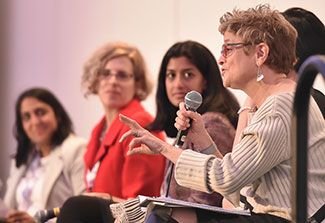How can we encourage female leaders in global health?
July / August 2017 | Volume 16, Issue 4

Photo courtesy of CUGH
During the CUGH annual meeting, Fogarty grantee
Dr. Michele Barry of Stanford University (right) discussed
how women can be supported as they pursue global
health careers.
Opinion by Fogarty Director Dr Roger I Glass
The burgeoning interest in global health over the last decade has attracted many enthusiastic women to the field. Indeed, at many universities they now make up the majority of students pursuing undergraduate courses in global health. Why, then, are there still so few women heading global health centers at medical schools or filling other leadership roles?
Although the numbers of female students are strong at the start, they decrease as cohorts advance in their careers. For instance, at Weill Cornell Medical College, 84 percent of undergraduates minoring in global health are women,
according to a paper published by a Cornell team. But only 70 percent of medical students pursuing global health concentrations are female. The study also examined staffing at the global health centers of 50 top medical schools and found fewer than 40 percent of faculty, and only 24 percent of directors, are female.
For women in the global south, there may be more overt gender discrimination and even fewer role models to provide mentorship and support. For example, only about a quarter of Africa's health ministers are women.
Why do so many women step off the global health career path? Are there factors we can change to close this gender gap?
Women can certainly face barriers in climbing institutional career ladders, such as building a family while pursuing a travel-intensive career, and confronting the health and safety issues that exist in many low-resource settings. These issues and others were explored by the Cornell group, as well as in a
discussion held at the Consortium of Universities for Global Health (CUGH) meeting last spring, where participants considered some possible solutions.
More training courses should be made available via short-term intensives offered in the summer or through distance learning options. Institutions must examine their hiring and promotion practices to ensure they are conducting outreach to qualified female candidates, and providing navigable career tracks with flexible pacing. Consideration ought to be given to troubleshooting possible barriers for well-qualified prospective hires, including helping identify positions for spouses, or locating care for children or elderly parents.
Women should also do their part, some suggested, by not pulling the ladder up behind them but instead reaching down to help their sisters advance. By advising others on some of the cultural, scientific or even practical issues faced by women working overseas, mentors - both women and men - can do much to encourage more females to continue on a global health path.
In my own life, I have watched my wife and daughter navigate these issues, which has given me a unique perspective. Although, early on, my wife followed me to Bangladesh for my research, she balanced raising three children with career advancement, and has reached the pinnacle of success as a medical school dean. Now, my daughter is plotting her own course, as a surgeon and mother of a toddler.
I know I'm not alone in valuing the contributions and insights of female global health scientists, who, after all, are intimately aware of the maternal and child health issues that are so critical in our field. They bring valuable insights and diverse opinions that help us collectively grapple with the toughest challenges we face.
It's to everyone's benefit that women remain engaged and take on more leadership roles in global health. I hope you will join me in working to support that goal.
More Information
To view Adobe PDF files,
download current, free accessible plug-ins from Adobe's website.